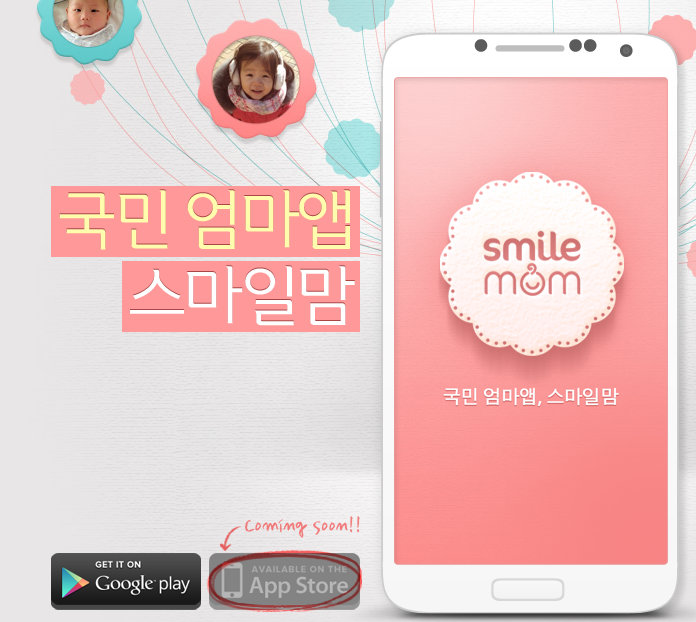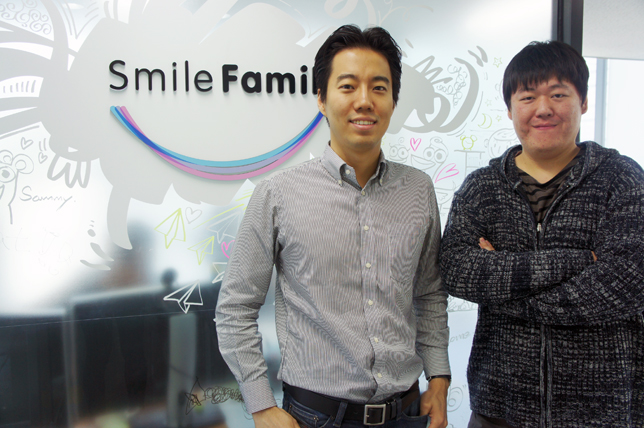
Startup Nomad 2013 is a three month long global accelerator program organized by The Ministry of Science, ICT and Future Planning and The National IT Industry Promotion Agency, and hosted by VentureSquare in collaboration with Plug&Play.
The Startup Nomad teams plan to leave in early November for Silicon Valley to participate in an acceleration program at Plug&Play Tech Center. Each team will undergo intensive mentoring and coaching to equip them with the tools to enter the global market. There will also be an opportunity to showcase the startup to local investors in the USA, and upon return to Korea, a Demo Day will be held on Dec 11th.
VentureSquare has taken this opportunity to hear about the global strategy and the expectations of each team waiting aboard on ‘Startup Nomad’ global accelerator program in Silicon Valley.
Smile Family Inc. is providing a service ‘Smile Mom’, the social network platform for moms. Using Smile Mom, you can put together all the photos and video clips of the daily journal for your baby and take advantage of social function that you mingle with the moms raising the same-aged babies.

I heard that you founded Smile Mom based on your experience of becoming a father.
When my wife went through pregnancy, I saw all along that my wife suffered from loneliness and post-natal depression, and also searched for helpful information about babies to share with other moms. I still remember what she said to me, “A smartphone is a window to the outer world while I’m jailed by babyrearing”.
Why do moms prefer smartphones than a PC? Actually I cannot imagine that moms use PCs when they care for their babies. Moms naturally use smartphones more, which are easily portable and controllable with one hand while the other one was occupied by babies. 64% of moms do so as well and the current total market size of baby products is about $100bn in the US.
We found out during our research on the relevant market that there is no hit product although there are many applications. For instance, moms use an application called ‘Babycenter’ the most in the US, this is rather focusing on pregnancy and childbirth with unilateral information delivery than a moms’ community, so users normally quit using within a year.
Now what? if there is none like what we imagined, let’s make it on our own- this was how Smile Mom was born.
Smile Family Inc. already has been funded. The business goes pretty well. Is there any reason why you wanted to join the accelerator program at this point?
I don’t think the medals and honors achieved in local market helps us go to the global market. Before going global, it is necessary that you have to gather the target market’s trend and feedback on your product as much as possible and touch up your product to optimize for the target market.
I think joining the accelerator program will give me boost-up in two aspects. First, I can make the best of the accelerator’s global network. The networking and pitching opportunity will definitely broaden my horizen in the global market. Second, the fact that we’ve been selected as Korean delegation for this program will give more trust to the people who we’re supposed to meet up with.
Which market has Smile Family Inc. put more focus on, and why?
So far, we’re taking two-track strategy on Korea and U.S. market. On Google Play, we’re doing beta-testing on both a Korean version and an English version, and users in the U.S. market showed more positive responses. Accordingly, U.S. market is our top priority.
We need the global market’s feedback on our product aside from the positive reviews from the U.S. users. That’s another reason we need to go global. When you say ‘go global’, there are two ways. First, start from local market and move forward with the locally successful model. Second, start from the scratch at the global market. It’s quite hard to find any successful predecents for both cases in reality. Smile Family will take time to gather market reponses and give a rebirth to new a Smile Mom for the global market.

You already have experienced global business through Paprika Lab, what’s the lession learned from the opportunity?
Paprika Lab has been merged by GREE, the Japanese mobile game company. Most of user influx came from the U.S., Europe, and Southeast Asia via Facebook. Korean users were less than 1 percent. That was great opportunity to learn about how global business works.
In global business, the most important thing for me was English and pitching skills. If you’re not a native English speaker or Korean-american, you have to overcome this hurdle to advance to the global market. In my case, I’ve spent 3 years of my childhood in the states. I kept practicing and updating my pitching skills afterwards.
One of vital role of the accelerator program is offering a training opportunity. In TechStar’s program, each team goes through 12 official pitching practice session. At every pitching phase, each team faces different themes and time lapses. Through this process, they get to be more natural on Demo day. If you have ‘Go Global’ in your mind, pitching practice is out of question.
It looks like it’s getting more like Silicon Vallley in S.Korea as we recently seen tons of policies supporting startups announced by the government. What do you think contributed to this phenomenon?
The norm of the standardized process is already set here in Silicon Valley, such as an average qualified level of pitching or a minimum requirement for funding, so I won’t probably encounter obstacles with experiences from Silicon Valley in other places. I hope that this ‘Valley’ culture will be smoothly melted into S.Korea’s startup environment, and an important thing is that startup teams will come back from Silicon Valley and make a contribution in heightening the standard and overall level of Korean startups, although, people might expect some visible outcome at once from them.
In addition, I expect that this kind of event can eventually make a good circulation system in S. Korea. For an instance in Israel, successful entrepreneurs guide startups with high potential, with R&D functions in Israel and business development in the US, whereas relevant financing is accomplished via the strong Jewish network in the finance industry. Likewise, we need to construct this type of value chain so that more and more Korean startups can expand their business globally, and the US market in particular. This does not mean that markets other than the US’s are meaningless, but rather the US is the one who leads the market standard.
What is Smile Family’s goal through the Startup Nomad program and its business plan in the US afterwards?

Smile Family plans to reach the following achievments.
1) Improving products by getting feedback from the Valley’s perspective
2) Improving pitch skills to get investments
3) Network building for potential partners, investors and recruitment
4) Exploring and excuting the collaboration process between R&D functions in Korea and business development in the US
5) Initiating the set-up of a subsidiariy in Silicon Valley
The most important thing is to get feedback our about products. Once we get feedback, we will reflect them on our products to improve product completion. In order to do so, local network building is essential, and in this regard, we will fully leverage on Plug&Play’s events and network.
In the long-run, within six months or a year from now we aim to get funding from local VCs and get successfully established in the US market.
Phil Libin, Evernote CEO, said,
“Toyota and GM have different vehicles localized for different markets, but BMW and Mercedes are the same everywhere you go. For low- and mid-level products, people’s wants and needs can be unique to their culture. But everyone around the world likes the same great stuff. At the high-end, tastes are global. Achieve a level of quality that transcends local tastes.”
This is Smile Family’s ultimate goal and we are expecting to have a successful business in the US through this opportunity.
You must be logged in to post a comment.